- Home
- Jr. Horatio Alger
Only an Irish Boy; Or, Andy Burke's Fortunes
Only an Irish Boy; Or, Andy Burke's Fortunes Read online
Produced by George Smith
ONLY AN IRISH BOY Or, Andy Burke's Fortunes by Horatio Alger, Jr.
Author of "Paul the Peddler," "Phil the Fiddler," "Strive and Succeed," "Slow and Sure," "Try and Trust," etc.
CONTENTS
Chapter I. ANDY BURKE II. A SKIRMISH III. ANDY AND HIS MOTHER IV. MRS. PRESTON V. A PROFITABLE JOB VI. THE TWO OLD MAIDS VII. ANDY OBTAINS A PLACE VIII. THE MIDNIGHT ALARM IX. WHAT FOLLOWED X. ANDY'S DEBUT AT SCHOOL XI. A GAME OF BALL XII. A LITTLE DIFFICULTY XIII. GODFREY'S REBELLION XIV. MR. STONE IS CALLED TO ACCOUNT XV. MRS. PRESTON'S DISCOMFITURE XVI. THE CHRISTMAS PRESENT XVII. INTRODUCES AN ADVENTURER XVIII. RIDING WITH A HIGHWAYMAN XIX. BAFFLED A ROBBER XX. HOW THE NEWS WAS RECEIVED XXI. A MODEL WIFE XXII. COLONEL PRESTON'S RECOVERY XXIII. MRS. BURKE HAS GOOD FORTUNE XXIV. ANDY'S JOURNEY XXV. THE MERCHANT FROM PORTLAND XXVI. SPINNING THE WEB XXVII. THE DROP GAME XXVIII. THE GUEST OF TWO HOTELS XXIX. A STARTLING EVENT XXX. COLONEL PRESTON'S WILL XXXI. MRS. PRESTON'S INTENTIONS XXXII. MRS. PRESTON'S REVENGE XXXIII. ANDY LOSES HIS PLACE XXXIV. THE WILL AT LAST XXXV. MRS. PRESTON IS UNPLEASANTLY SURPRISED XXXVI. ALL'S WELL THAT ENDS WELL
ONLY AN IRISH BOY
CHAPTER IANDY BURKE
"John, saddle my horse, and bring him around to the door."
The speaker was a boy of fifteen, handsomely dressed, and, to judgefrom his air and tone, a person of considerable consequence, in hisown opinion, at least. The person addressed was employed in the stableof his father, Colonel Anthony Preston, and so inferior in socialcondition that Master Godfrey always addressed him in imperious tones.
John looked up and answered, respectfully:
"Master Godfrey, your horse is sick of the disease, and your fatherleft orders that he wasn't to go out on no account."
"It's my horse," said Godfrey; "I intend to take him out."
"Maybe it's yours, but your father paid for him."
"None of your impudence, John," answered Godfrey, angrily. "Am Imaster, or are you, I should like to know!"
"Neither, I'm thinking," said John, with a twinkle in his eye. "It'syour father that's the master."
"I'm master of the horse, anyway, so saddle him at once."
"The colonel would blame me," objected John.
"If you don't, I'll report you and get you dismissed."
"I'll take the risk, Master Godfrey," said the servant,good-humoredly. "The colonel won't be so unreasonable as to send meaway for obeying his own orders."
Here John was right, and Godfrey knew it, and this vexed him the more.He had an inordinate opinion of himself and his own consequence, andfelt humiliated at being disobeyed by a servant, without being able topunish him for his audacity. This feeling was increased by thepresence of a third party, who was standing just outside the fence.
As this third party is our hero, I must take a separate paragraph todescribe him. He was about the age of Godfrey, possibly a littleshorter and stouter. He had a freckled face, full of good humor, butat the same time resolute and determined. He appeared to be one whohad a will of his own, but not inclined to interfere with others,though ready to stand up for his own rights. In dress he compared veryunfavorably with the young aristocrat, who was biting his lips withvexation. In fact, though he is my hero, his dress was far fromheroic. He had no vest, and his coat was ragged, as well as his pants.He had on a pair of shoes two or three times too large for him. Theyhad not been made to order, but had been given him by a gentleman ofnearly double his size, and fitted him too much. He wore a straw hat,for it was summer, but the brim was semi-detached, and a part of hisbrown hair found its way through it.
Now Godfrey was just in the mood for picking a quarrel with somebody,and as there was no excuse for quarreling any further with John, hewas rather glad to pitch into the young stranger.
"Who are you?" he demanded, in his usual imperious tone, and with acontraction of the brow.
"Only an Irish boy!" answered the other, with a droll look and aslight brogue.
"Then what business have you leaning against my fence?" again demandedGodfrey, imperiously.
"Shure, I didn't know it was your fence."
"Then you know now. Quit leaning against it."
"Why should I, now? I don't hurt it, do I?"
"No matter--I told you to go away. We don't want any beggars here."
"Shure, I don't see any," said the other boy, demurely.
"What are you but a beggar?"
"Shure, I'm a gintleman of indepindent fortune."
"You look like it," said Godfrey, disdainfully. "Where do you keepit?"
"Here!" said the Irish boy, tapping a bundle which he carried over hisshoulder, wrapped in a red cotton handkerchief, with a stick thrustthrough beneath the knot.
"What's your name?"
"Andy Burke. What's yours?"
"I don't feel under any obligations to answer your questions," saidGodfrey, haughtily.
"Don't you? Then what made you ask me?"
"That's different. You are only an Irish boy."
"And who are you?"
"I am the only son of Colonel Anthony Preston," returned Godfrey,impressively.
"Are you, now? I thought you was a royal duke, or maybe QueenVictoria's oldest boy."
"Fellow, you are becoming impertinent."
"Faith, I didn't mean it. You look so proud and gintale that it's jista mistake I made."
"You knew that we had no dukes in America," said Godfrey,suspiciously.
"If we had, now, you'd be one of them," said Andy.
"Why? What makes you say so?"
"You're jist the picture of the Earl of Barleycorn's ildest son that Isaw before I left Ireland."
Godfrey possessed so large a share of ridiculous pride that he feltpleased with the compliment, though he was not clear about itssincerity.
"Where do you live?" he asked, with a slight lowering of his tone.
"Where do I live? Shure, I don't live anywhere now, but I'm going tolive in the village. My mother came here a month ago."
"Why didn't you come with her?"
"I was workin' with a farmer, but the work gave out and I came home.Maybe I'll find work here."
"I think I know where your mother lives," said John, who had heard theconversation. "She lives up the road a mile or so, in a little housewith two rooms. It's where old Jake Barlow used to live."
"Thank you, sir. I guess I'll be goin', then, as my mother'll beexpectin' me. Do you know if she's well?" and a look of anxiety cameover the boy's honest, good-natured face.
The question was addressed to John, but of this Godfrey was not quitesure. He thought the inquiry was made of him, and his pride wastouched.
"What should I know of your mother, you beggar?" he said, with asneer. "I don't associate with such low people."
"Do you mane my mother?" said Andy, quickly, and he, too, looked angryand threatening.
"Yes, I do. What are you going to do about it?" demanded Godfrey.
"You'd better take it back," said Andy, his good-humored face now darkwith passion.
"Do you think I am afraid of such a beggar as you?" sneered Godfrey."You appear to forget that you are speaking to a gentleman."
"Shure, I didn't know it," returned Andy, hotly. "You're no gentlemanif you insult my mother, and if you'll come out here for a minute I'llgive you a bating."
"John," said Godfrey, angrily, "will you drive that beggar away?"
Now, John'
s sympathies were rather with Andy than with his youngmaster. He had no great admiration for Godfrey, having witnessedduring the year he had been in his father's employ too much of theboy's arrogance and selfishness to feel much attachment for him. Hadhe taken any part in the present quarrel, he would have preferredespousing the cause of the Irish boy; but that would not have beenpolite, and he therefore determined to preserve his neutrality.
"That ain't my business, Master Godfrey," he said. "You must fightyour own battles."
"Go away from here," said Godfrey, imperiously advancing toward thatpart of the fence against which Andy Burke was leaning.
"Will you take back what you said agin' my mother?"
"No, I won't."
"Then you're a blackguard, if you are a rich man's son."
The blood rushed to Godfrey's face on the instant. This was a palpableinsult. What! he, a rich man's son, the only son and heir of ColonelAnthony Preston, with his broad acres and ample bank account--he to becalled a blackguard by a low Irish boy. His passion got the better ofhim, and he ran through the gate, his eyes flashing fire, bent onexterminating his impudent adversary.

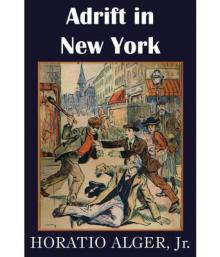 Adrift in New York: Tom and Florence Braving the World
Adrift in New York: Tom and Florence Braving the World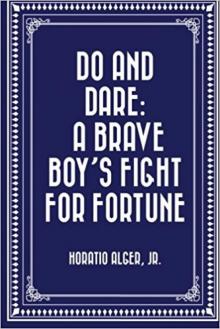 Do and Dare — a Brave Boy's Fight for Fortune
Do and Dare — a Brave Boy's Fight for Fortune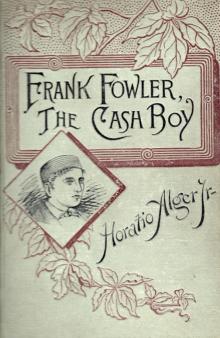 The Cash Boy
The Cash Boy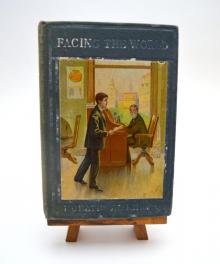 Facing the World
Facing the World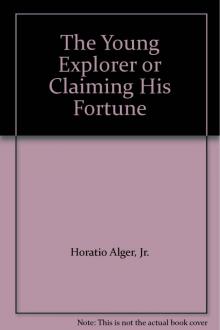 The Young Explorer; Or, Claiming His Fortune
The Young Explorer; Or, Claiming His Fortune The Store Boy
The Store Boy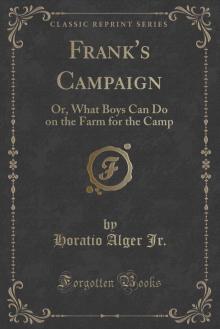 Frank's Campaign; Or, The Farm and the Camp
Frank's Campaign; Or, The Farm and the Camp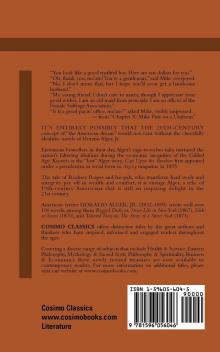 Cast Upon the Breakers
Cast Upon the Breakers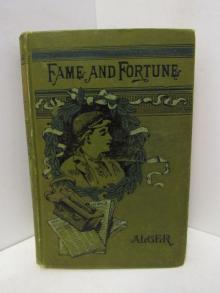 Fame and Fortune; or, The Progress of Richard Hunter
Fame and Fortune; or, The Progress of Richard Hunter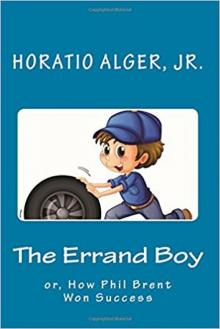 The Errand Boy; Or, How Phil Brent Won Success
The Errand Boy; Or, How Phil Brent Won Success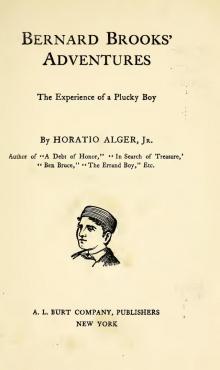 Bernard Brooks' Adventures: The Experience of a Plucky Boy
Bernard Brooks' Adventures: The Experience of a Plucky Boy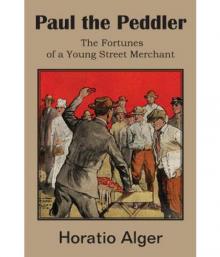 Paul the Peddler; Or, The Fortunes of a Young Street Merchant
Paul the Peddler; Or, The Fortunes of a Young Street Merchant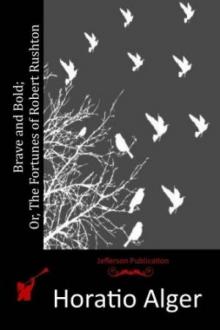 Brave and Bold; Or, The Fortunes of Robert Rushton
Brave and Bold; Or, The Fortunes of Robert Rushton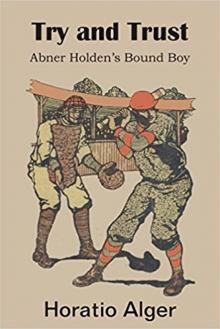 Try and Trust; Or, Abner Holden's Bound Boy
Try and Trust; Or, Abner Holden's Bound Boy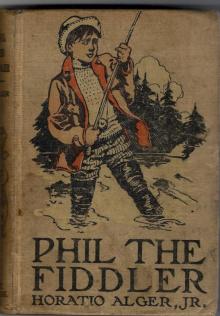 Phil, the Fiddler
Phil, the Fiddler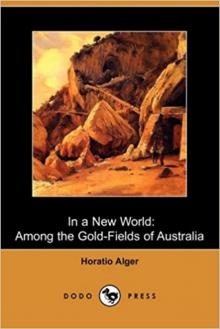 In A New World; or, Among The Gold Fields Of Australia
In A New World; or, Among The Gold Fields Of Australia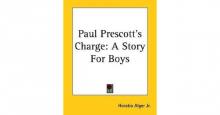 Paul Prescott's Charge
Paul Prescott's Charge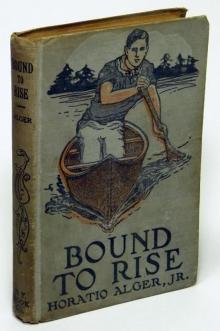 Joe's Luck; Or, Always Wide Awake
Joe's Luck; Or, Always Wide Awake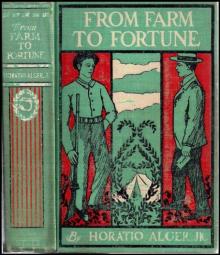 From Farm to Fortune; or, Nat Nason's Strange Experience
From Farm to Fortune; or, Nat Nason's Strange Experience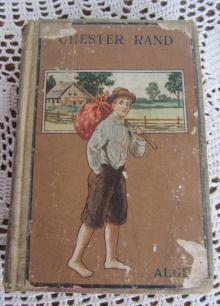 Chester Rand; or, The New Path to Fortune
Chester Rand; or, The New Path to Fortune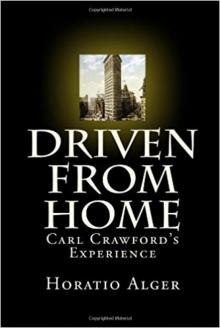 Driven from Home; Or, Carl Crawford's Experience
Driven from Home; Or, Carl Crawford's Experience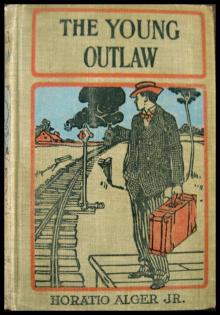 The Young Outlaw; or, Adrift in the Streets
The Young Outlaw; or, Adrift in the Streets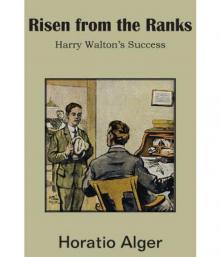 Risen from the Ranks; Or, Harry Walton's Success
Risen from the Ranks; Or, Harry Walton's Success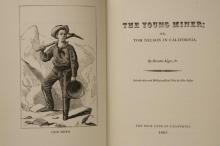 The Young Miner; Or, Tom Nelson in California
The Young Miner; Or, Tom Nelson in California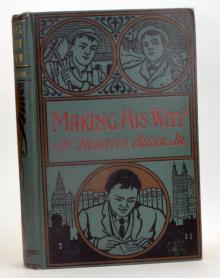 Making His Way; Or, Frank Courtney's Struggle Upward
Making His Way; Or, Frank Courtney's Struggle Upward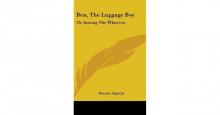 Ben, the Luggage Boy; Or, Among the Wharves
Ben, the Luggage Boy; Or, Among the Wharves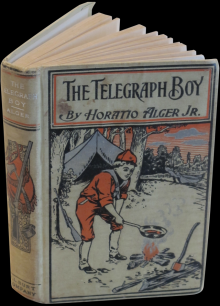 The Telegraph Boy
The Telegraph Boy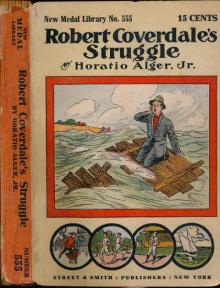 Robert Coverdale's Struggle; Or, on the Wave of Success
Robert Coverdale's Struggle; Or, on the Wave of Success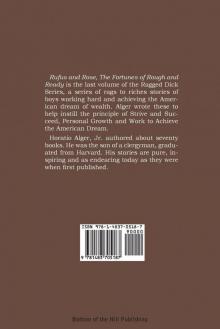 Rufus and Rose; Or, The Fortunes of Rough and Ready
Rufus and Rose; Or, The Fortunes of Rough and Ready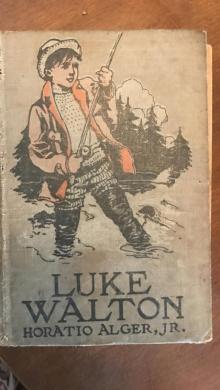 Luke Walton
Luke Walton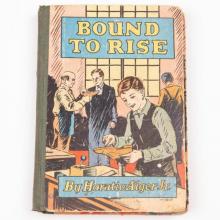 Mark Mason's Victory: The Trials and Triumphs of a Telegraph Boy
Mark Mason's Victory: The Trials and Triumphs of a Telegraph Boy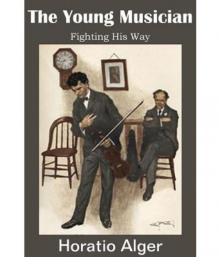 The Young Musician; Or, Fighting His Way
The Young Musician; Or, Fighting His Way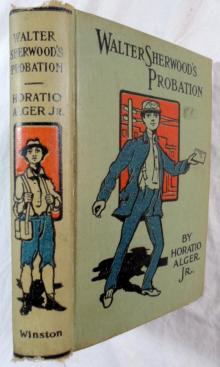 Walter Sherwood's Probation
Walter Sherwood's Probation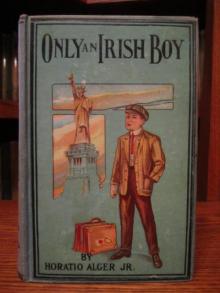 Only an Irish Boy; Or, Andy Burke's Fortunes
Only an Irish Boy; Or, Andy Burke's Fortunes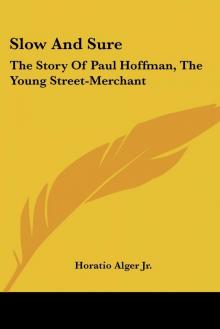 Slow and Sure: The Story of Paul Hoffman the Young Street-Merchant
Slow and Sure: The Story of Paul Hoffman the Young Street-Merchant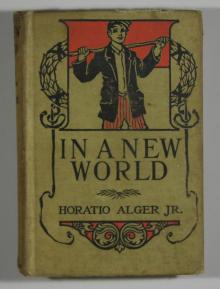 Herbert Carter's Legacy; Or, the Inventor's Son
Herbert Carter's Legacy; Or, the Inventor's Son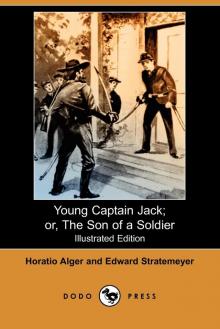 Young Captain Jack; Or, The Son of a Soldier
Young Captain Jack; Or, The Son of a Soldier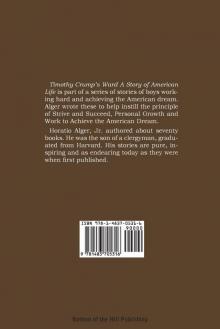 Timothy Crump's Ward: A Story of American Life
Timothy Crump's Ward: A Story of American Life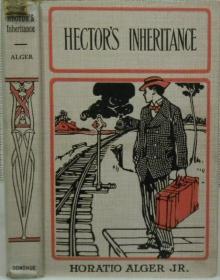 Hector's Inheritance, Or, the Boys of Smith Institute
Hector's Inheritance, Or, the Boys of Smith Institute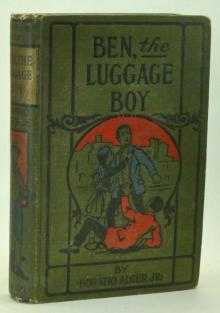 Ben's Nugget; Or, A Boy's Search For Fortune
Ben's Nugget; Or, A Boy's Search For Fortune